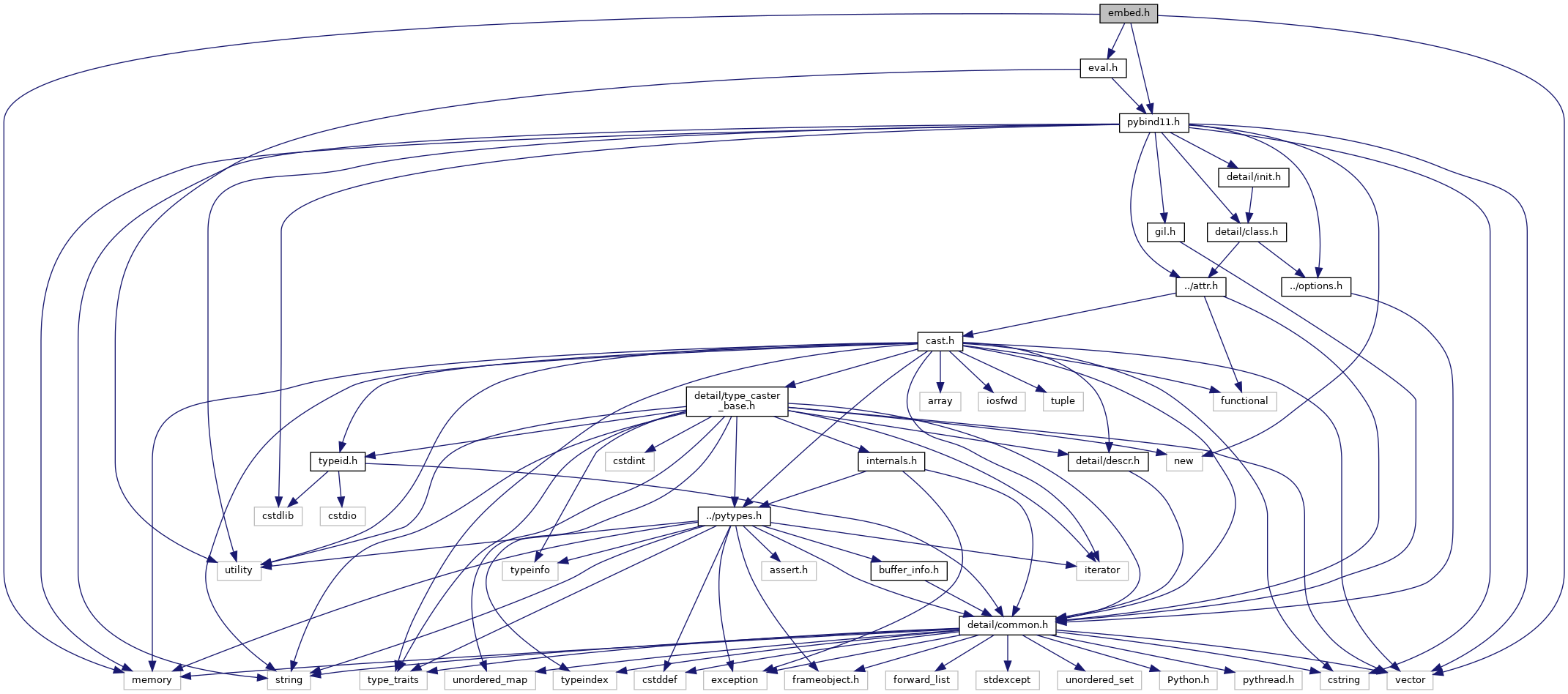

Go to the source code of this file.
Classes | |
| struct | embedded_module |
Python 2.7/3.x compatible version of PyImport_AppendInittab and error checks. More... | |
| class | scoped_interpreter |
| struct | wide_char_arg_deleter |
Macros | |
| #define | PYBIND11_EMBEDDED_MODULE(name, variable) |
| #define | PYBIND11_EMBEDDED_MODULE_IMPL(name) |
| #define | PYBIND11_PYCONFIG_SUPPORT_PY_VERSION_HEX (0x03080000) |
Functions | |
| void | finalize_interpreter () |
| void | initialize_interpreter (bool init_signal_handlers=true, int argc=0, const char *const *argv=nullptr, bool add_program_dir_to_path=true) |
| void | initialize_interpreter_pre_pyconfig (bool init_signal_handlers, int argc, const char *const *argv, bool add_program_dir_to_path) |
| void | precheck_interpreter () |
| wchar_t * | widen_chars (const char *safe_arg) |
Macro Definition Documentation
◆ PYBIND11_EMBEDDED_MODULE
| #define PYBIND11_EMBEDDED_MODULE | ( | name, | |
| variable | |||
| ) |
\rst Add a new module to the table of builtins for the interpreter. Must be defined in global scope. The first macro parameter is the name of the module (without quotes). The second parameter is the variable which will be used as the interface to add functions and classes to the module.
.. code-block:: cpp
PYBIND11_EMBEDDED_MODULE(example, m) {
... initialize functions and classes here m.def("foo", []() { return "Hello, World!"; }); } \endrst
◆ PYBIND11_EMBEDDED_MODULE_IMPL
| #define PYBIND11_EMBEDDED_MODULE_IMPL | ( | name | ) |
◆ PYBIND11_PYCONFIG_SUPPORT_PY_VERSION_HEX
| #define PYBIND11_PYCONFIG_SUPPORT_PY_VERSION_HEX (0x03080000) |
Function Documentation
◆ finalize_interpreter()
|
inline |
\rst Shut down the Python interpreter. No pybind11 or CPython API functions can be called after this. In addition, pybind11 objects must not outlive the interpreter:
.. code-block:: cpp
{ // BAD
py::initialize_interpreter();
auto hello = py::str("Hello, World!");
py::finalize_interpreter();
} // <-- BOOM, hello's destructor is called after interpreter shutdown
{ // GOOD
py::initialize_interpreter();
{ // scoped
auto hello = py::str("Hello, World!");
} // <-- OK, hello is cleaned up properly
py::finalize_interpreter();
}
{ // BETTER
py::scoped_interpreter guard{};
auto hello = py::str("Hello, World!");
}
.. warning::
The interpreter can be restarted by calling `initialize_interpreter` again. Modules created using pybind11 can be safely re-initialized. However, Python itself cannot completely unload binary extension modules and there are several caveats with regard to interpreter restarting. All the details can be found in the CPython documentation. In short, not all interpreter memory may be freed, either due to reference cycles or user-created global data.
\endrst
◆ initialize_interpreter()
|
inline |
\rst Initialize the Python interpreter. No other pybind11 or CPython API functions can be called before this is done; with the exception of PYBIND11_EMBEDDED_MODULE. The optional init_signal_handlers parameter can be used to skip the registration of signal handlers (see the Python documentation_ for details). Calling this function again after the interpreter has already been initialized is a fatal error.
If initializing the Python interpreter fails, then the program is terminated. (This is controlled by the CPython runtime and is an exception to pybind11's normal behavior of throwing exceptions on errors.)
The remaining optional parameters, argc, argv, and add_program_dir_to_path are used to populate sys.argv and sys.path. See the |PySys_SetArgvEx documentation|_ for details.
.. _Python documentation: https://docs.python.org/3/c-api/init.html#c.Py_InitializeEx .. |PySys_SetArgvEx documentation| replace:: PySys_SetArgvEx documentation .. _PySys_SetArgvEx documentation: https://docs.python.org/3/c-api/init.html#c.PySys_SetArgvEx \endrst
◆ initialize_interpreter_pre_pyconfig()
|
inline |